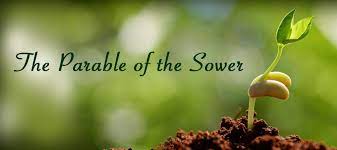Beloved in Christ,
The seed given to the one who sows is the "Divine Word" that comes forth from the mouth of God. It will achieve its purpose because it is fertile and fruitful (Is. 55:10-11). It will yield a fruitful harvest if it falls on good ground (Ps 65). Meanwhile, we groan as we await the attainment and fulfillment of this fruitful end (Rom 8: 18-23). Christ sows this seed- God's Word. Some fell on the path, some on rocky ground, some among thorns, and some on rich soil. The seed that fell on the rich soil achieved its purpose; it produced fruit "a hundred or sixty or thirtyfold" (Mt. 13: 1-9). What kind of soil are we? How receptive are we to the word of God? Are we the rich soil open and conducive to the word of God? Is the soil of our heart well cultivated for healthy growth of the Word seed Jesus sows in it?
As Jesus explains to his disciples, the parable of the sower is a metaphor or analogy for hearing the word of the kingdom. The seeds are of great value, yet the sower throws seeds carelessly into unproductive soil. Is this a reflection of God's abundance and generosity? He sows the seed in unproductive soil. He sows seed into the path (those who hear the word without understanding), rocky ground (those who heard the word with joy, but it lasts only for a short while because it has no root ) and among thorns ( those who hear the word but fail to bear fruits because of worldly anxiety and the lure of riches). God generously gives all his children the divine word of his kingdom, including those who will not put it to productive use. God will go to any length to save and bring us into his kingdom. He continues to sow the seed into productive and unproductive soils.
God's word will bear fruit because God says so. There will be those who refuse the word. There will be those who have yet to listen to and understand the word. There will be those who reject it. Nevertheless, there will also be those who work hard to understand and accept the word of the kingdom. We are the soil for the divine seed. What is the condition of our soil? Is our soil well prepared to receive and support the growth of the divine seed? Our responsibility is to prepare our soil to respond positively to the grace of the divine seed, the grace of God's word. In human form, we are to avoid letting our body and soul become empty and distracted; they are not to be allowed to become hardened or clogged by worldly concerns, they are not to be closed but be opened to the access of God's grace, we must be willing to practice detachment and embrace sacrifice for the word of grace to find a home in our soul. Our utmost goal must be to see that the grace we receive yields multiple fruits by corresponding to the grace God constantly dispenses on our souls. In other words, the degree to which we open up to God's grace will determine how fruitful we become.
Have we chosen to be the good soil that will receive God's grace and bear fruit? As St. John Chrysostom says, "The only thing that matters is that we should not be a beaten-down thoroughfare, or rocky ground, or thorns, but that we should be good soil." Let us do the one thing that truly matters: be the good soil. We get to make that choice.
One way to ensure we choose to be good soil is to begin the art of preparing our hearts for the seed at the early beginning of our lives. Our parish Vacation Bible School (VBS) starts this Sunday at 6 p.m. I ask for your support for our children's adventure into the wilderness of God's word. I am thankful to Georgann Azzalina, our religious education coordinator, and her team of volunteers for their labor in this vital ministry to our little ones.
Enjoy your summer vacation. Attend mass when out of town, and bring me bulletins from the churches you attended for mass.
In Christ,
Fr. Bernard, OP

 RSS Feed
RSS Feed